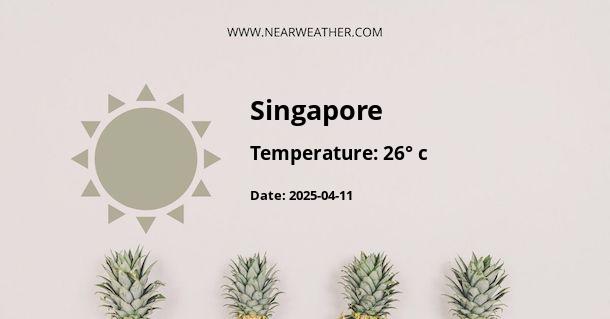The Climate and Weather of the Republic of Singapore
The Republic of Singapore, commonly known as Singapore, is a sovereign island city-state located in Southeast Asia. It is situated at the southern tip of the Malay Peninsula, with a total land area of approximately 719.1 square kilometers (277.6 square miles). Despite its small size, Singapore experiences a tropical rainforest climate throughout the year, characterized by high humidity and abundant rainfall.
Annual Weather Patterns
Singapore has a fairly consistent climate year-round, with relatively small variations in temperature. The average annual temperature in Singapore ranges from 25 to 31 degrees Celsius (77 to 88 degrees Fahrenheit). The warmest months are typically April and May, with temperatures often reaching up to 34 degrees Celsius (93 degrees Fahrenheit). The coolest months are usually December and January, with temperatures dropping to around 23 degrees Celsius (73 degrees Fahrenheit).
While Singapore does not experience distinct seasons like countries in temperate regions, it does have two main monsoon seasons that significantly affect its weather patterns. The Northeast Monsoon season occurs from December to March, while the Southwest Monsoon season occurs from June to September. During these monsoon periods, Singapore experiences higher levels of rainfall and occasionally encounters thunderstorms.
Rainfall and Humidity
Singapore is known for its high levels of rainfall and humidity throughout the year. The average annual rainfall in the city-state is approximately 2,400 millimeters (94.5 inches), with the wettest months being November and December. These months can experience heavy rainfall and occasional prolonged showers.
Due to its proximity to the equator, Singapore experiences high humidity levels, with an average relative humidity of around 80%. The humidity can sometimes reach up to 90% during the rainy season. This high humidity, combined with warm temperatures, creates a tropical and often sweltering climate in the city-state.
Weather Phenomena
While Singapore is not prone to extreme weather phenomena such as hurricanes or typhoons, it can experience occasional weather events that may disrupt normal activities. Thunderstorms are relatively common, especially during the monsoon seasons, and can bring heavy rain, lightning, and strong winds.
Haze is another weather phenomenon that can affect Singapore. Haze is caused by the burning of forests in neighboring countries, particularly Indonesia, during the dry season. It results in a thick layer of smoke and pollutants in the air, leading to reduced visibility and poor air quality. The haze typically occurs between June and October, although its severity can vary from year to year.
Recommended Attire and Precautions
Given Singapore's tropical climate, it is important to dress appropriately and take certain precautions when visiting or living in the city-state. Lightweight and breathable clothing made from natural fibers, such as cotton or linen, is recommended to help combat the heat and humidity. It is also advisable to carry an umbrella or raincoat, as sudden rain showers can occur at any time.
Due to the high levels of humidity, it is important to stay hydrated by drinking plenty of water throughout the day. Sunscreen with a high SPF is also recommended to protect the skin from the intense tropical sun. It is also advisable to seek shade or air-conditioned environments whenever possible to avoid heat exhaustion.
Singapore's Climate Resilience
Singapore, despite its small size and vulnerability to climate change, has implemented various measures to enhance its climate resilience. The city-state has invested in extensive drainage systems and reservoirs to manage heavy rainfall and mitigate flooding. The government has also launched initiatives to promote sustainability, such as increasing green spaces and implementing energy-efficient practices.
Furthermore, Singapore is actively involved in international efforts to combat climate change. It has pledged to reduce its greenhouse gas emissions and has set targets for increasing the share of renewable energy in its energy mix. The city-state is also exploring innovative solutions, including the development of floating solar panels and the integration of green technologies into its urban infrastructure.
Conclusion
Singapore experiences a tropical rainforest climate characterized by high humidity and abundant rainfall throughout the year. While it does not have distinct seasons, it has two main monsoon seasons that bring increased rainfall. The city-state's climate resilience efforts, combined with its commitment to combat climate change, demonstrate its proactive approach to dealing with the challenges posed by its unique climate.
A - Singapore's Latitude is 1.366670 & Longitude is 103.800003.
A - Weather in Singapore is 28° today.
A - Climate Conditions in Singapore shows broken clouds today.
A - Humidity in Singapore is 84% today.
A - Wind speed in Singapore is 5 km/h, flowing at 168° wind direction. today.
